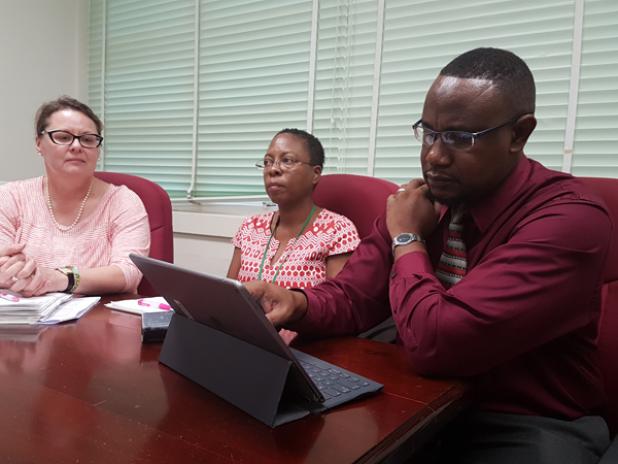
From left: Education Lead Specialist with the Inter-American Development Bank, Dr. Sabine Reible-Aubourg; Acting Principal at the Lester Vaughan School, Tanya Harding; and Acting Director of the Information Technology and Quality Assurance Unit at the Ministry of Education, Junior Burgess, during yesterday’s press conference at the Cane Garden, St. Thomas institution.
Learning challenges being addressed
THE Lester Vaughan School continues to focus on helping students who are having problems understanding the technicalities of the English Language.
According to Acting Principal Tanya Harding, through the School Improvement Grant, funded by the Inter-American Development Bank under the Skills For the Future Programme, the institution has started to train teachers in areas of literacy and numeracy.
Harding said the school has also begun to acquire equipment to be placed in specialists rooms where the classes to teach the respective disciplines will take place.
“Well the first training was to let teachers be familiar with how to deal with children with learning disabilities, [and] with learning problems generally. It looked at initial diagnoses and then it also looked at methodologies that can be used in the classroom to improve their academic progress. Our next step will be looking at the diagnosis of dyslexia, as well as some of the other learning problems,” Harding said.
Education Lead Specialist with the Inter-American Development Bank, Dr. Sabine Reible-Aubourg, said the purpose of the grant is to give secondary schools additional funding to improve literacy and numeracy, as well as technical and vocational education skills. The grant is intended to help with the Caribbean Vocational Qualifications and the National Vocational Qualifications.
Yesterday, the Education Lead Specialist and a team from the Ministry of Education, Science, Technology and Innovation toured the Lester Vaughan School in Cane Garden, St. Thomas, to see how the grant is being used.
Dr. Reible-Aubourg explained that the visit to the institutions that benefited from the grant is to find out how the participating schools are advancing, what results they are seeing, the challenges they are facing, and also the lessons learnt in order to inform future initiatives.
“Up to this point, the schools visited are very positive and each School Improvement Grant is different. There is not one size fits all. The schools have been asked to identify their specific problems and find solutions to them, and so their responses vary and the measures taken vary also.
“But overall, for all the schools visited, progress is being made. Some have particular challenges, but everyone is working on addressing them. So we hope that at the end of the initiatives, we can see improved student learning in the areas of numeracy and literacy as well as on technical and vocational education training,” Dr. Reible-Aubourg said.
Acting Director of the Information Technology and Quality Assurance Unit at the Ministry of Education, Junior Burgess, explained that 12 schools were selected to participate in the programme, based on their performance at the Barbados Secondary Schools’ Entrance Examination.
Burgess said based on the initial selection, schools submitted proposals that were reviewed by himself and four Senior Education Officers. The proposals were ranked and schools were awarded the grants based on the scores they received. (AH)
